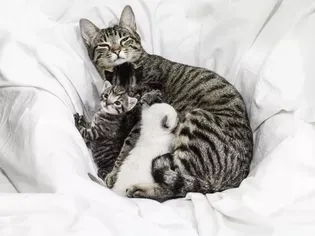What to Do if a Mother Cat Can't Nurse Her Kittens
Updated on 04/26/24

What to Do if a Mother Cat Can't Nurse Her Kittens: A Comprehensive Guide for Concerned Pet Owners
Introduction
The bond between a mother cat and her kittens is one of nature's most heartwarming spectacles. However, there may come times when the mother cat is unable to nurse her kittens due to illness, injury, or other reasons. In such situations, it's crucial for pet owners to understand what steps to take to ensure these vulnerable newborns receive the nourishment they need. This comprehensive guide will provide in-depth information on the causes of maternal nursing difficulties, the signs to watch for, and effective strategies to care for kittens that cannot nurse.
Understanding the Causes of Nursing Difficulties
1. Medical Conditions: Illness or injury can prevent a mother cat from nursing her kittens. Medical issues such as mastitis (inflammation of the mammary glands), infections, uterine problems, or overall weakness can impair her ability to produce or deliver milk.
2. Insufficient Milk Production: Some mother cats may not produce enough milk to feed all their kittens. This can occur due to hormonal imbalances, stress, or a lack of proper nutrition.
3. Rejection by the Mother: In rare cases, a mother cat may reject her kittens and refuse to nurse them. This can be caused by stress, hormonal issues, or a lack of maternal instincts.
Signs That a Mother Cat Cannot Nurse Her Kittens
1. Kittens Crying Excessively: Persistent crying is a strong indication that kittens are not being adequately nourished.
2. Lack of Weight Gain: Kittens should gain weight steadily in the first few weeks of life. If they are not gaining weight or are losing weight, it suggests they are not receiving enough milk.
3. Dehydration: Kittens who are not nursing properly may become dehydrated and lethargic. Check for sunken eyes, dry gums, and a lack of response.
4. Fading Kitten Syndrome: In severe cases, kittens that are not receiving adequate nourishment can develop fading kitten syndrome, a life-threatening condition characterized by weakness, lethargy, and failure to thrive.
Steps to Care for Kittens That Cannot Nurse
1. Consult a Veterinarian: It's essential to take the mother cat and kittens to a veterinarian as soon as possible to determine the underlying cause of the nursing difficulties and receive professional guidance.
2. Bottle Feeding: If the mother cat is unable to nurse, bottle feeding is the best alternative. Use a specifically designed kitten formula and follow the veterinarian's instructions carefully.
3. Frequency and Amount: Kittens should be fed small amounts of formula every 2-4 hours round-the-clock in the first few weeks of life. As they grow older, the frequency of feedings can be gradually reduced.
4. Burping: After each feeding, gently burp the kittens by holding them upright and patting their backs. This helps prevent gas buildup in their stomachs.
5. Stimulating Elimination: Kittens cannot urinate or defecate on their own. Use a warm, damp cloth or cotton ball to gently stimulate the area around their genitals and anus after each feeding.
6. Warmth: Kittens' body temperatures can drop rapidly, so provide them with a warm, comfortable environment. Use a heating pad covered with a towel or a cozy nest lined with soft blankets.
Special Considerations for Orphaned Kittens
If the mother cat has abandoned or died, kittens become orphans and require even more intensive care. In addition to the steps outlined above, special considerations include:
1. Socialization: Orphaned kittens lack the interaction with their mother and siblings, which is crucial for their socialization. Provide them with plenty of human handling and interaction to help them develop into well-adjusted cats.
2. Monitoring Health: Orphaned kittens are more susceptible to infections and health problems due to their lack of maternal antibodies. Monitor their health closely and seek veterinary care as needed.
3. Long-Term Care: Orphaned kittens may require additional care and support throughout their lives. They may have underlying health conditions or may struggle with behavioral issues related to their lack of mothering.
Conclusion
Caring for kittens that cannot nurse their mother can be a challenging but rewarding experience. By understanding the causes of nursing difficulties, recognizing the signs of inadequate nourishment, and implementing proper care strategies, pet owners can provide these vulnerable newborns with the nourishment and support they need to thrive. Remember to consult a veterinarian regularly for guidance and support throughout the process. With patience, love, and appropriate care, kittens that cannot nurse their mothers can grow into healthy and happy cats.
Explore More Pets

Cat Behavior Problems
How to Stop Aggression in Kittens

Long-Haired Cat Breeds
Siberian Cat: Breed Profile, Characteristics, & Care

Cat Behavior Problems
How to Stop Kittens From Scratching and Biting

Long-Haired Cat Breeds
Turkish Angora: Cat Breed Profile, Characteristics & Care

Basic Training
How to Socialize Your Kitten

Short-Haired Cat Breeds
Cute Pictures & Facts About Calico Cats & Kittens

Litter Box Training
Training Your Kitten to Use the Litter Box

Long-Haired Cat Breeds
10 Fun Facts About White Cats